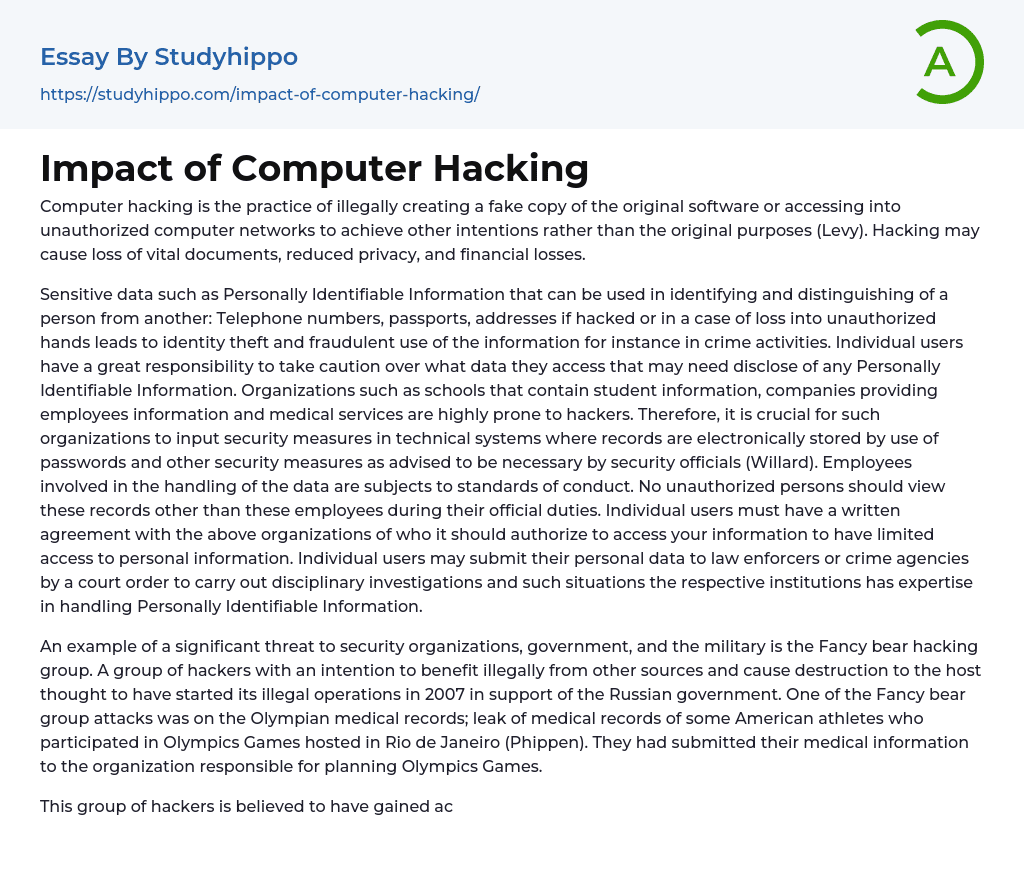Computer hacking is the practice of illegally creating a fake copy of the original software or accessing into unauthorized computer networks to achieve other intentions rather than the original purposes (Levy). Hacking may cause loss of vital documents, reduced privacy, and financial losses.
Sensitive data such as Personally Identifiable Information that can be used in identifying and distinguishing of a person from another: Telephone numbers, passports, addresses if hacked or in a case of loss into unauthorized hands leads to identity theft and fraudulent use of the information for instance in crime activities. Individual users have a great responsibility to take caution over what data they access that may need disclose of any Personally Identifiable Information. Organizations such as schools that contain student information, companies providing employees information and medical services are highly prone to hackers. Therefore, it
...is crucial for such organizations to input security measures in technical systems where records are electronically stored by use of passwords and other security measures as advised to be necessary by security officials (Willard). Employees involved in the handling of the data are subjects to standards of conduct. No unauthorized persons should view these records other than these employees during their official duties. Individual users must have a written agreement with the above organizations of who it should authorize to access your information to have limited access to personal information. Individual users may submit their personal data to law enforcers or crime agencies by a court order to carry out disciplinary investigations and such situations the respective institutions has expertise in handling Personally Identifiable Information.
An example of a significant threat to security organizations, government, and the military is
the Fancy bear hacking group. A group of hackers with an intention to benefit illegally from other sources and cause destruction to the host thought to have started its illegal operations in 2007 in support of the Russian government. One of the Fancy bear group attacks was on the Olympian medical records; leak of medical records of some American athletes who participated in Olympics Games hosted in Rio de Janeiro (Phippen). They had submitted their medical information to the organization responsible for planning Olympics Games.
This group of hackers is believed to have gained access to the committee's computers and had entry to a database created up for the Rio Olympics. They had access to all the confidential medical records of these athletes of which they released to the public causing a breach of contract. This created mistrust of the organization responsible for planning Olympics Games. Other than that the athletes faced a global embarrassment the public having had information about their medical test which they had undertaken and the recommended drugs they had been allowed for health conditions. Confidential information about these athletes released to the public caused distress not only to the victims but also to the rest of the unexposed athletes who have their personal information with the organizations. The targeted athletes have had their reputation smeared through this criminal attack by the fancy bear hacking group that even goes on further to confidently declare they will continue with their reckless expose of personal information.
Conclusion
Personal information stolen from an individual is a very disturbing situation that can cause a lot of mental torture through stress. It is a situation that would cause unrest
if my personal information was publicly leaked. It is therefore crucial for organizations and individuals to input security measures in technical systems where records are electronically stored by either the use of passwords or other security measures to protect their personal information against hackers.
Works Cited
- Levy, Steven. Hackers. Sebastopol, CA: O'Reilly Media, 2010. Internet resource.
- Phippen, J. Weston. "Hackers Released The Medical Records Of 25 More Olympians". The Atlantic. N.p., 2016. Web. 23 Oct. 2016.
- Willard, Nancy E. Cyber-safe kids, cyber-savvy teens: Helping young people learn to use the Internet safely and responsibly. Jossey-Bass, 2007.
- Animal Cruelty essays
- Law Enforcement essays
- Juvenile Justice System essays
- Surveillance essays
- Forensic Science essays
- Crime Prevention essays
- Criminal Justice essays
- Criminology essays
- Drug Trafficking essays
- Juvenile Delinquency essays
- Organized Crime essays
- Penology essays
- Prison essays
- Property Crime essays
- Punishment essays
- Serial Killer essays
- Sexual Offence essays
- Victim essays
- Crime scene essays
- Punishments essays
- Charles Manson essays
- Juvenile Crime essays
- Piracy essays
- Stealing essays
- Gang essays
- Hate Crime essays
- Homicide essays
- Damages essays
- Murder essays
- Robbery essays
- Ted Bundy essays
- Prostitution essays
- Violent crime essays
- Rape essays
- Identity Theft essays
- Sexual Harassment essays
- Distracted Driving essays
- Drunk Driving essays
- Detention essays
- Sexual Assault essays
- Sexual Assault on College Campuses essays
- Cyber Crime essays
- White Collar Crime essays
- Fur essays
- Federal Bureau Of Investigation essays
- Fire Department essays
- Criminal Justice System essays
- Commitment essays
- Mass Incarceration essays
- Kill essays




